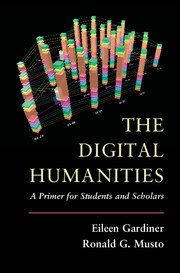Book contents
- Frontmatter
- Contents
- List of Illustrations
- Preface and Acknowledgments
- 1 Introduction to the Digital Humanities
- 2 The Organization of Humanities Research
- 3 The Elements of Digital Humanities: Text and Document
- 4 The Elements of Digital Humanities: Object, Artifact, Image, Sound, Space
- 5 Digital Tools
- 6 Digital Environments
- 7 Publication: Prerelease, Release and Beyond
- 8 The Meta-Issues of Digital Humanities 1
- 9 Meta-Issues 2: Copyright and Other Rights, Digital Rights Management, Open Access
- 10 The Evolving Landscape for the Digital Humanities
- Epilogue: The Half-Life of Wisdom
- Appendix: Digital Tools
- Notes
- Glossary
- Bibliography on Digital Humanities
- Index
10 - The Evolving Landscape for the Digital Humanities
Published online by Cambridge University Press: 05 July 2015
- Frontmatter
- Contents
- List of Illustrations
- Preface and Acknowledgments
- 1 Introduction to the Digital Humanities
- 2 The Organization of Humanities Research
- 3 The Elements of Digital Humanities: Text and Document
- 4 The Elements of Digital Humanities: Object, Artifact, Image, Sound, Space
- 5 Digital Tools
- 6 Digital Environments
- 7 Publication: Prerelease, Release and Beyond
- 8 The Meta-Issues of Digital Humanities 1
- 9 Meta-Issues 2: Copyright and Other Rights, Digital Rights Management, Open Access
- 10 The Evolving Landscape for the Digital Humanities
- Epilogue: The Half-Life of Wisdom
- Appendix: Digital Tools
- Notes
- Glossary
- Bibliography on Digital Humanities
- Index
Summary
INTRODUCTION
Every landscape has two aspects to it: the perspective and other external points of view and the view obtained by the human agent moving in and through it. “What begins as undifferentiated space becomes place as we get to know it better, endow it with value.” With the new insights garnered from landscape studies and humanists' embrace of such fields as rural archaeology, we have begun to realize more fully and to understand better the human impact upon landscapes: everything from agriculture to the clearance of rivers and swamps and forests to massive land moving. Simon Schama's classic Landscape and Memory is one example of how literary and historical studies have traced the changing understanding of the landscape – from ancient and medieval awe to Romantic idealization to industrial utilitarianism. Such new studies have provided deep insights into how we understand the world around us – the world through which we move and in which we work and live.
In the same way, throughout this book we have described the impact of the digital upon the humanities and how it has changed many aspects of research and disciplinary thought; but in this chapter we will first briefly discuss the impact of humanists as agents upon the world of computing. We began our discussion with Roberto Busa's request to Thomas Watson for help in building a search engine for the massive corpus of Thomas Aquinas 's works. That collaboration remains paradigmatic of the way in which humanists have approached the world of the computer in its first stages.
The library world had been working for years on various computer solutions to issues raised by humanities research questions: cataloging, word and metadata searches, sorts and report formats. At the universities of Michigan, California and Virginia, for example, library and computing departments have set up various offices to accommodate the humanists’ research agendas, and we have reviewed these in detail in many places throughout this book.
- Type
- Chapter
- Information
- The Digital HumanitiesA Primer for Students and Scholars, pp. 166 - 177Publisher: Cambridge University PressPrint publication year: 2015



